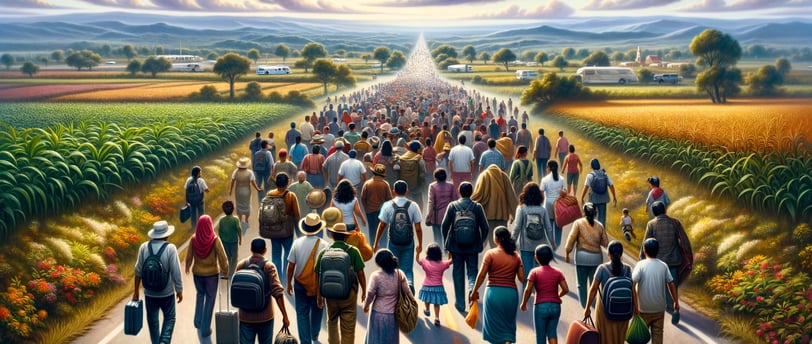

The Local Church in the Face of Massive Immigration
A Call to Love, Mercy, and Grace
Introduction
Massive immigration is a global phenomenon affecting millions in their quest for better living conditions, fleeing violence, poverty, persecution, or political crises. The United States ranks among the top destinations for immigrants, especially those from Central and South America, who cross borders seeking refuge, asylum, or employment. However, this reality poses significant challenges for the host country, which must address the economic, social, cultural, and political repercussions of welcoming such a diverse and vulnerable population.
The local church, embedded in society and as a catalyst for change, cannot remain indifferent to this situation. On the contrary, it is called to adopt a stance of love, mercy, and grace towards immigrants, recognizing in them the image of God and the opportunity to serve our neighbor. For this, it is essential that the church equips itself with theological, doctrinal, sociological, and anthropological resources to understand the complexity of the migration phenomenon and respond comprehensively and effectively. The purpose of this article is to offer a biblical, theological, and practical reflection on the effects of massive immigration in the United States, from a Christian and Wesleyan perspective, contemplating the challenges and opportunities faced by the contemporary local church, as well as outlining practical, Scripture-based actions to contribute to the solution.
Massive Immigration:
A Challenge and Opportunity for the Local Church
Massive immigration is not a recent phenomenon in human history or in the church's history. From the Old Testament stories, we observe how God led His people through various migrations due to famine, war, slavery, or exile. We also notice that God established laws and principles for just treatment of foreigners, orphans, and widows, who were the most vulnerable groups in society. For example, in the book of Exodus, it is instructed: "Do not mistreat or oppress a foreigner, for you were foreigners in Egypt" (Exodus 22:21, NIV). Similarly, in Leviticus, it is commanded: "When a foreigner resides among you in your land, do not mistreat them. The foreigner residing among you must be treated as your native-born. Love them as yourself, for you were foreigners in Egypt; I am the LORD your God" (Leviticus 19:33-34, NIV).
In the New Testament, we also find stories of migrations, both voluntary and forced, that influenced the early church. The persecution that arose after Stephen's death dispersed believers throughout Judea and Samaria, thus facilitating the spread of the gospel (Acts 8:1-4). We also observe how the apostle Paul undertook several missionary journeys across the Mediterranean, establishing churches in different cities and among various cultures. Jesus himself identified with migrants, saying: "For I was hungry and you gave me something to eat, I was thirsty and you gave me something to drink, I was a stranger and you invited me in" (Matthew 25:35, NIV).
These biblical passages illustrate that immigration is part of God's design for His people and that the church is called to receive, protect, integrate, and promote immigrants as an expression of its love for God and neighbor. However, this mandate represents a challenge, as the church must overcome barriers that stand in the way of Christian hospitality, such as prejudice, discrimination, racism, xenophobia, nationalism, individualism, fear, or indifference, elements that not only permeate society but can also infiltrate the church, leading it to isolation, conformity, or polarization in the face of massive immigration.
At the same time, massive immigration offers a significant opportunity for the local church, allowing it to live out its evangelizing mission, celebrate its cultural diversity, strengthen its spiritual unity, and reaffirm its social commitment. The presence of immigrants offers the church the chance to share the gospel, learn from other traditions, appreciate the richness of creation, practice justice and peace, and thus manifest the kingdom of God on earth. Immigrants should not be seen only as people in need, but also as individuals endowed with gifts, talents, experiences, and resources that enrich the body of Christ. The church can and should recognize in immigrants brothers and sisters in the faith, with whom it shares the same hope and grace.
A Christian and Wesleyan Perspective on Massive Immigration
To adequately address the effects of massive immigration in the United States, it is essential that the local church is guided and inspired by a Christian perspective. This perspective is rooted in divine revelation expressed in the Scriptures, in the rich tradition of the church, in reason enlightened by the Holy Spirit, and in the personal and collective experience of faith. Collectively known as the Wesleyan quadrilateral, these four pillars allow us to discern God's will and contextualize it in our present reality.
From this vision, we affirm that massive immigration is a matter of universal relevance, as it reflects God's image in every human being and reminds us of our condition as pilgrims on earth.
The Scriptures reveal to us that God, as the creator of all nations, establishes their times and borders (Acts 17:26) and, as redeemer, longs for the salvation and knowledge of the truth for all peoples (1 Timothy 2:4). Thus, massive immigration confronts us with our intrinsic equality before God and our common need for His grace and love.
Moreover, massive immigration challenges us to live out the commandment of love, which is the synthesis of the law and the prophets (Matthew 22:37-40). Love, the essence of the divine character and distinctive of the children of God (1 John 4:7-8; John 13:35), is manifested in concrete actions beyond words (1 John 3:18). This love privileges the most disadvantaged: the poor, the marginalized, the oppressed, and the needy (Matthew 25:31-46), and extends to all without exception of race, class, gender, culture, religion, or nationality (Galatians 3:28; Colossians 3:11). Sacrificial love, modeled by Christ (John 15:13; 1 John 3:16), is expressed in mercy and grace, and is lived out in hospitality, which welcomes, shares, serves, and coexists with the other as a brother or sister in the faith.
Finally, the Christian and Wesleyan perspective teaches us that massive immigration is a challenge to live in holiness, understood as conformity to God's will and perfection in love (1 Thessalonians 4:3; Matthew 5:48). Holiness transcends individual morality and becomes a social and relational reality, seeking the transformation of our character, mind, heart, and will through the action of the Holy Spirit. It is evidenced in our testimony and conduct; in our words, attitudes, relationships, ethics, politics, economics, ecology, culture, and society. Holiness is manifested in our commitment to justice and peace, fruits of divine reconciliation, and translates into service, generosity, solidarity, humility, joy, and hope.
Practical and Biblical Actions for the Local Church in the Face of Massive Immigration
In the face of the challenge of massive immigration, we ask ourselves as a church: How can we contribute effectively? What concrete, Bible-anchored actions can we undertake? We propose some initiatives, not as a closed list, but as inspiration for reflection and action.
§ Pray: Prayer is fundamental, as it recognizes God's sovereignty and our dependence on Him. Let us pray for immigrants, their needs, and their well-being; for leaders and legislators; and for our church, so that it remains faithful in its mission and testimony.
§ Educate: Training is key to understanding and acting in the context of immigration. Let us educate ourselves in the disciplines that help us understand this phenomenon and educate society about the value and rights of immigrants.
§ Welcome: Hospitality is an essential Christian value. Let us be a community that opens its doors and hearts, offering a safe refuge, counsel, and support to immigrants.
§ Integrate: Let us promote integration without immigrants losing their unique identity. Let us facilitate their participation in society and in our ecclesial community, respecting their traditions, and fostering collaboration.
§ Promote: Empowering immigrants is crucial for them to be agents of their own story. Let us encourage their potential and share with them the gospel and the hope we find in Christ.
Conclusion
Massive immigration is a palpable reality that affects both the United States and the rest of the world, presenting significant challenges and opening opportunities for the local church. In the face of this, the church cannot afford the luxury of indifference, rejection, fear, or condemnation of immigrants; its calling is to love, welcome, integrate, and promote them as a manifestation of its loyalty to God and His Word. It is imperative to adopt a Christian and Wesleyan perspective that allows the church to understand and confront this reality with an attitude shaped by creation, love, mercy, grace, holiness, justice, and peace that emanate from God. The church can and should adopt practical and biblical measures to contribute to the solution of this issue, including prayer, education, hospitality, integration, and the promotion of immigrants, seeing them as brothers and collaborators in faith and mission.
The church has the opportunity to be a reflection and a harbinger of the kingdom of God, a community where there are no foreigners but one family, one nation, one people, united under one shepherd, one Lord, one God and Father of all.
